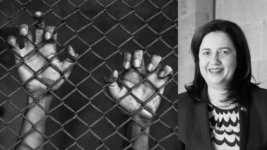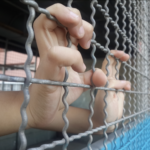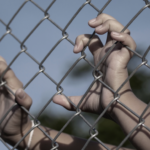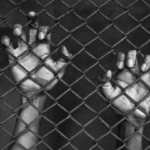Palaszczuk’s Punitive Youth Justice Reforms are Misguided and Potentially Unlawful

Not only is the Palaszczuk government moving to enact harsher youth crime laws at a time when the clear message is that locking up kids is counterproductive and fails to address the societal causes of such lawbreaking, but it’s undermining its own recently established human rights regime to do so.
A 21 February joint statement from Queensland premier Anastasia Palaszczuk, police minister Mark Ryan and youth justice minister Leanne Linard outlines that they’re making good on a 29 December promise to make tough laws “even tougher”, via a suite of new youth crime law reforms.
Currently, in Queensland, youth offenders are aged between 10 to 17. According to the ministers, most don’t offend again following “diversionary and rehabilitation programs”, but the reforms are to tackle the 17 percent of “serious repeat offenders”, who commit 50 percent of state youth crime.
However, it’s not until one peruses the content of the explanatory notes relating to the Strengthening Community Safety Bill 2023 that it becomes clear the Labor government plans to breach its own Human Rights Act 2019 (HRA) in order to progress a key youth crime law reform.
And this entirely disappointing development is a clear sign that in Australia, a nation long devoid of proper human rights safeguards, that even when such protections are in place, they’re not secure, but rather, they’re negotiable and based on the whim of whichever party is in power.
Breaching bail and human rights
The crime reform package includes extending the period of conditional release orders from 3 to 6 months. Similar to suspended sentences, these orders see offenders in the community under strict conditions, with the bill further aiming to ensure that those who breach their terms end up inside.
Another youth crime amendment will provide courts with the ability to label a child as a “serious repeat offender” and, therefore, be the subject of tougher sentencing principles. And the government is expanding the list of offences that presumption against bail is applied to – so as to make it harder to achieve a successful bail application.
However, the most controversial reform is the reinstatement of breach of bail as an offence for youth offenders for the first time this century, as the enactment and application of this law contravenes the HRA.
Right now, section 29 of the Bail Act 1980 (Qld) contains the offence of breach of bail, which can see an individual put away for up to 2 years, and it also stipulates that the law does not apply to a child defendant.
But the Safety Bill, if enacted, will remove this clause. And it will insert a new one outlining that the youth breach of bail offence does not violate the HRA, “despite being incompatible with human rights” and regardless of any of the provisions set out in the state’s rights protecting legislation.
“Enabling children to be charged with an offence of breach of bail under section 29 of the Bail Act will impact on the rights and liberties of child defendants as it exposes them to criminal proceedings and penalties,” the bill’s notes explain.
“This is considered justified to ensure that children comply with bail conditions.”
Locking up First Nations kids
Not only is Queensland violating human rights to ensure children are sent to youth prisons, but this reform is coming at a time when the public in many Australian jurisdictions are railing against presumption against bail laws, increased remand numbers and the incarceration of youth.
Remand involves an offender being held in prison whilst the outcome of their case is still pending. So, such individuals either remain unconvicted or unsentenced.
Over the five years to June 2020, youth remandees in Queensland consistently made up about 30 percent of all young people in prison.
This is set to continue to rise under the coming reforms and it coincides with a decade-long campaign to raise the age of criminal responsibility to at least 14 years old, as children under that age are yet to develop their cognitive abilities to the point of fully comprehending criminal actions.
The 2023 Productivity Commission report outlines that Queensland had, on average, 267 youths in prison on a daily basis over 2021-22, which was the highest rate in the country. And of these, 177, or 66 percent, were First Nations kids imprisoned by the state.
On an average day over those 12 months, 121 of the kids Queensland had incarcerated were aged between 10 and 13 years old, with 92 of them, or 76 percent, being First Nations children.
A clear takeaway here is that the Palaszczuk government is currently moving to reform youth crime laws in order to ensure that more First Nations children are kept inside youth gaols for longer periods.
A lack of federal protection
The Palaszczuk government is able to progress a law that violates human rights as section 43 of the HRA expressly provides an override power to parliament to declare within an Act that it or another piece of legislation has effect despite rights incompatibility in “exceptional circumstances”.
The explanatory notes that accompanied the HRA prior to its enactment state that such exceptional circumstances include “war, a state of emergency or an exceptional crisis situation constituting a threat to public safety, health or order”.
Queensland was only the third Australian jurisdiction to enact legislation that guarantees citizens and residents rights are protected under the law. The Australian Capital Territory was the first to pass such protections in 2004, and this was followed by Victoria two years later.
Indeed, Australia is the only western liberal democracy that doesn’t protect rights at the federal level. And the understanding that this permits authorities to encroach upon freedoms and liberties, which they wouldn’t otherwise be able to do under a HRA, is growing amongst the community.
And while debate over enacting federal rights protections goes back to the constitutional conventions of the 1890s, the campaign for such legislation has increased of late, whilst the nation’s international human rights standing has been waning due to a series of negative appraisals.
So, while the commitment to rights made by the Palaszczuk government was widely heralded, and it further provided impetus to the national HRA campaign, the fact that Labor so easily eroded guaranteed rights to punish troubled kids, raises questions around the ability of such laws to protect.







